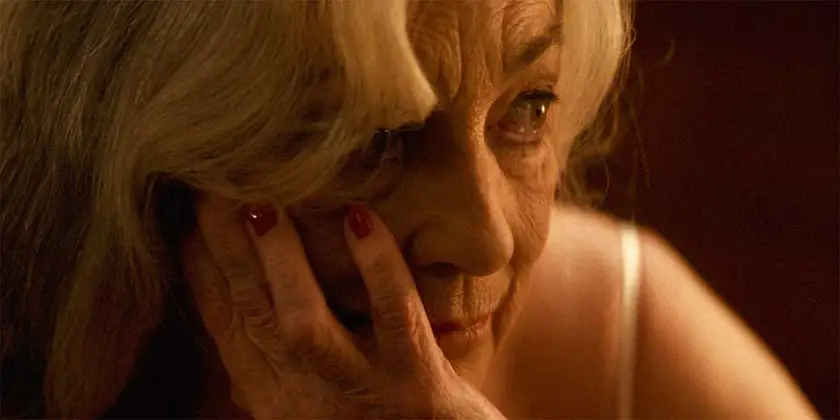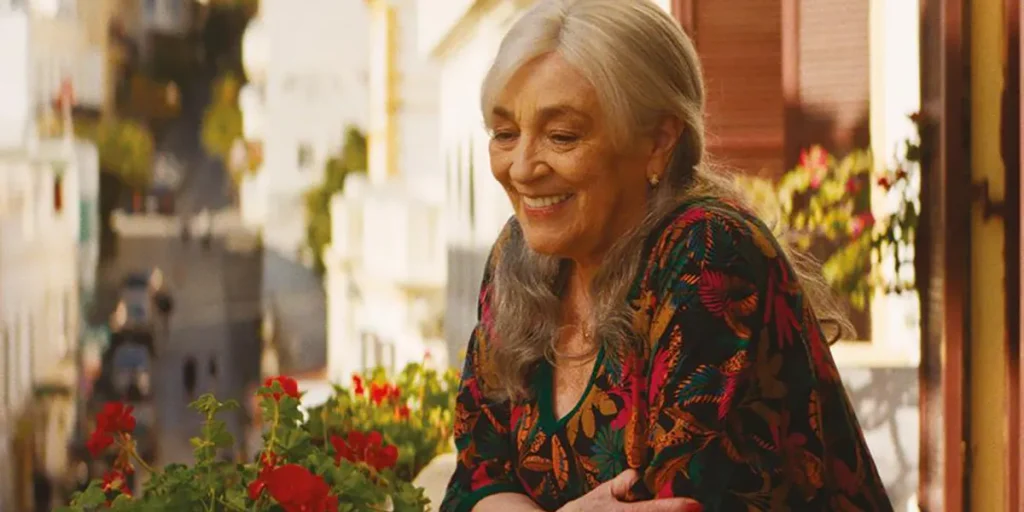Carmen Maura is superb as a woman who dares to be herself in Maryam Touzani’s Calle Malaga, a stunning film about grief, love, and the human experience.
Writer & Director: Maryam Touzani
Genre: Drama, Romance, Comedy
Run Time: 116′
Venice World Premiere: August 29, 2025 (Spotlight)
U.S. Release Date: February 6, 2026
U.K. Release Date: TBA
From the very first scenes of Calle Malaga, you immediately know you’re watching a Maryam Touzani film. The writer-director, best known for The Blue Caftan (2022), presents her characters with such intimacy, warmth, and raw authenticity that you care about them from the moment they enter the frame. At once disarmingly vulnerable and incredibly tough, Touzani’s characters wear their pasts on their sleeves, down to their most painful memories.
But they know exactly who they are, and it’s this honesty and empathy in the storytelling that makes audiences so invested in their tales.
Calle Malaga‘s protagonist is María Ángeles (Carmen Maura), a 79 years old Spanish woman who lives in Tangier, northern Morocco. Touzani introduces her native city as a “melting pot for languages and cultures,” whose proximity to Spain saw a large Spanish community flee Franco and settle there in the 1930s. While some of these people left, other remained visceralmente ligados (“viscerally tied”) to “a land to which they all feel they belong”.
This sense of belonging shines through from the very first shots of Calle Malaga, which show María Ángeles buying food at the local market, strolling through the bustling street as if she were part of it, in complete harmony with her environment. We smile as she brags to one of the vendors about finding “three eggs with double yolks,” and we follow her back to the titular apartment; there, she starts chopping vegetables, and the warmth she radiates breaks through the screen and enters our homes.
Toda una vida me estaría contigo (“all my life I’d stay with you”), sings María Dolores Pradera as the notes of her song “Toda Una Vida” come from the record player, one of María Ángeles’s most prized possessions. No me importa en qué forma, ni dónde ni cómo, pero junto a ti (“I don’t care in which shape, nor where or how, but together with you”), the song continues, and our protagonist starts singing along to herself. And just like that, we know all we need to know about María Ángeles, from the sadness and grief she carries to the quiet acceptance that lets her go on with her life, and the role that her hometown plays in all of this.

But the life María Ángeles has lovingly crafted for herself is about to be turned inside out. Soon, her daughter Clara (Marta Etura) shows up at her door. Hola, mi niña, says María Ángeles, but Clara has things to say. Having just arrived from Madrid, where she lives and works as a nurse, Clara explains that she has been broke for a while and she has decided to sell the apartment in Calle Malaga, in which María Ángeles has always lived. “I can’t keep throwing my money away on rent,” says Clara, resolutely.
“You have no obligations keeping you here,” she adds, but even from the thirteen minutes of María Ángeles’s life we’ve just experienced, we know she’s wrong. Calle Malaga isn’t just a home for the woman: it’s part of her entire identity. For her whole life, it has provided her with the most fundamental needs at the core of the human experience: a sense of belonging given by a community that embraces her, where she can truly be herself, and whose acceptance can help her endure her grief over important losses.
Still, Clara has the power to evict her mother, and the plan has to move forward. María Ángeles has a choice: join her daughter’s family in Madrid, or move to a home for the elderly that can accommodate her for free. María Ángeles opts for the latter but it’s immediately clear that it won’t do. With Clara back in Madrid, our protagonist realizes that she’s still in charge of her own life, and she has a home to get back to.
From this synopsis, you’re probably expecting Calle Malaga to play out in a certain way, but you couldn’t be more wrong. Touzani plays with genre conventions to deliver an unpredictable gem of a movie that’s just as raw and affecting as The Blue Caftan was but that also shows how much she has grown as a writer and director. Love is in store for our hero and the film gives us many heartwarming moments, including some intimate scenes that brim with authenticity and affection.
But there’s also plenty of comedy that comes from María Ángeles simply being herself. We dare you not to laugh at her blunt interactions with her nun friend Josefa (María Alfonsa Rosso), who has taken a vow of silence, which means that María Ángeles can unleash all her unfiltered thoughts on her. And then there’s this everpresent undercurrent of grief that we can perceive at all times, regardless of what María Ángeles is doing.
We don’t know everything about every single character in the film, including the protagonist, but we don’t need to. Touzani intentionally keeps part of everyone’s lives outside of the frame, only hinting at certain aspects of the story – from the mother-daughter relationship to and past losses to other generations of women in the family who still live through out protagonists.
But Touzani never forgets that this is María Ángeles’s story first and foremost, and it’s refreshing and even revolutionary to watch our protagonist in action. In every single thing she does – from business endeavors to the most hilarious form of blackmail – we are given a protagonist who doesn’t need to be rescued. Almost like a modern western hero, this woman dares to take charge and challenge preconceived gender notions, claiming what she’s worth in a way that’s entirely her own, and succeeding at that thanks to her integrity and determination.
As María Ángeles, Carmen Maura (Women on the Verge of a Nervous Breakdown) is phenomenal: it’s the kind of performance that would have earned her the Volpi Cup for Best Actor at the Venice Film Festival if only this film had been screened in competition, and not in the “Spotlight” strand. There’s a scene early in the film where Carla tells her mum she had an estate agent come look at the house, and María Ángeles turns to her daughter with a look that tells us everything we need to know about her mental state. She doesn’t even have to say a word for us to perceive the rage she’s feeling, but there’s also a certain sadness, and of course there’s love, but also grief. If María Ángeles is so complex and raw as a character, it’s because Maura plays her like nobody else could have.
Ahmed Boulane (Islands) plays Abslam, who eventually becomes María Ángeles’s love interest. Though Abslam is only intoduced halfway through the film, Boulane’s empathetic portrayal makes him essential to this story. A scene where María Ángeles breaks up a fight all on her own and we see her through Abslam’s eyes is one of the best moments of the film: the warmth and respect in his eyes define their entire relationship, in a refreshingly healthy example of two people in love who still manage to retain their individual identities too.
Cinematographer Virginie Surdej (The Blue Caftan, Mexico 86) keeps the camera focused on Maura, with a blend of close-ups and tracking shots of María Ángeles moving toward us. Despite this being an introspective, intimate movie, it always has rhythm, thanks to a screenplay that keeps on delivering till the end. The sound design (Freya Arde) immerses us into María Ángeles’s thoughts when it needs to, and the track that comes up several times, María Dolores Pradera’s “Toda Una Vida,” is the perfect song to accompany our protagonist’s ever-changing life, assuming different connotations – from grief to familiarity to new love – throughout the film.
A series of smart visual choices help shape our hero’s identity, from costumes that change to reflect María Ángeles’s evolution alongside the film’s color palette to ever-present flowers that assume different meanings as we reach new stages of her life. A series of props return just when they need to, making the house in Calle Malaga feel more familiar and lived-in, filled with the kind of symbolism you’d expect in a modern fairy tale.
Just like in the best fairy tales, Touzani doesn’t explain everything. We don’t know exactly what happened between María Ángeles and Carla that made their relationship so strained, or how our protagonist lost her husband, years before this story started. In fact, there are many more things that we don’t know about our characters, but Touzani gives us some pieces of the puzzle, and it’s up to us to make up the rest.
This is a story that reaches us in a way that’s just as visceral as our protagonist’s (and, possibly, the director’s) relationship with Tangier: at its core, Calle Malaga is a film about the universal needs that shape the human experience, and it’s easy to recognize ourselves in María Ángeles too. With a project that’s just as affecting and enthralling as her previous work but that also feels so much more personal and mature, Touzani confirms herself as one of the most interesting and distinctive voices in film right now.
Calle Malaga: Movie Plot & Recap
Synopsis:
A 79 years old Spanish woman’s perfectly happy life in Tangier changes when her daughter arrives, having decided to sell her home. Facing eviction but determined to stay, she does everything she can to keep her home and ends up rediscovering herself in the process.
Pros:
- Carmen Maura is superb
- A genre-defying story that’s as heartwarming as it is genuinely funny
- Well-rounded, authentic characters you’ll care about from the start, with immersive world-building that make both Tangier and the titular Calle Malaga feel familiar and warm
- Smart visual choices and great technical execution
- The protagonist is a strong woman who wears her vulnerabilities on her sleeve but also knows exactly who she is and what she’s worth, defying preconceived gender notions by simply being herself
- A believable love story at its center, portrayed with affection and in a realistic way
- Plenty of symbolism to give the film more meaning
Cons:
- The mother-daughter relationship, and particularly the reason for the daughter’s refusal to listen to her mother, could have been explored better, but this isn’t the story Touzani is telling
Calle Malaga had its World Premiere at the Venice Film Festival on August 29, 2025, in the Spotlight section. The film will be released in U.S. theaters on February 6, 2026, with its North American Theatrical Premiere at Film Forum.

